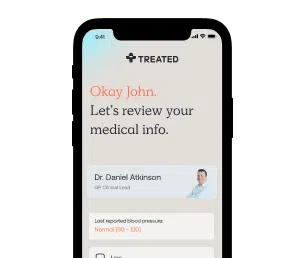Altitude Sickness
Treatment and prevention for altitude sickness.
Altitude sickness is caused by a lack of oxygen at heights of above 2,500 metres. It can be treated and prevented effectively with treatment.
Tell us about your health, and get expert treatment recommendations. Order altitude sickness treatment online, delivered to your door.
Altitude sickness, also known as acute mountain sickness, is a condition that’s caused by the body’s inability to get enough oxygen. It can become a serious threat to your health if it’s not treated promptly, although most people make a full recovery.
It occurs at altitude, where the oxygen is thinner, making it harder for the body to process it. Thankfully, there are many ways it can be avoided with careful planning.
Unlike many conditions, age, gender and health rarely have an impact on the condition, so no one group of people are more likely to suffer from it than another. Having suffered from it before will also not lessen the symptoms of the condition or the likelihood of you experiencing it again.
The biggest risk of getting altitude sickness comes from a lack of preparation. It’s vital if you know you’ll be in a high altitude environment that you put in place measures to avoid the condition and treat it, should it develop.
The likelihood of experiencing altitude sickness relates to the altitude you are in. For example, it’s not possible to experience the condition in the UK because the highest peak is under 1,500m. Altitude sickness only occurs at heights of over 2,500m.
It’s also important to note that you are just as likely to experience it in a city, such as La Paz in Bolivia, as you are climbing a mountain. In fact, as the change in altitude happens more quickly after a flight, travelling to a high altitude city can increase the risk of the condition occurring.
If you’re going to be at altitudes of over 2,500m, you’re likely to experience at least some mild symptoms. These risks can be reduced with careful planning.

How we source info.
When we present you with stats, data, opinion or a consensus, we’ll tell you where this came from. And we’ll only present data as clinically reliable if it’s come from a reputable source, such as a state or government-funded health body, a peer-reviewed medical journal, or a recognised analytics or data body. Read more in our editorial policy.
Altitude sickness is caused by a lack of oxygen in the body, which itself is caused by the thinning of oxygen levels that develop the higher up you go. And it’s worse if you haven’t taken the time to acclimatise to the new altitude.
The first symptom you might notice is difficulty breathing, which can be a particular problem when combined with physical exertion, including climbing a mountain.
There are many ways to avoid altitude sickness, or at least minimise its risks. These include climbing slowly so the body can adjust to the changes in oxygen levels, resting regularly if you’re on a steep climb, and stopping climbing for an entire day every few days if the altitude is particularly steep.
You should also avoid becoming dehydrated, avoid alcohol or smoking, and eating heavy meals, although they should remain high in calories if you’re climbing.
It can take a few hours for the symptoms of altitude sickness to present. This means that even if you have made your descent, you might continue to feel its effects. You’ll usually start to feel symptoms after six hours, but it can take at least a day.
Symptoms have been compared to those of a bad hangover, including headaches, dizziness and nausea. You might also experience a loss of appetite, shortness of breath and general fatigue.

How we source info.
When we present you with stats, data, opinion or a consensus, we’ll tell you where this came from. And we’ll only present data as clinically reliable if it’s come from a reputable source, such as a state or government-funded health body, a peer-reviewed medical journal, or a recognised analytics or data body. Read more in our editorial policy.

How we source info.
When we present you with stats, data, opinion or a consensus, we’ll tell you where this came from. And we’ll only present data as clinically reliable if it’s come from a reputable source, such as a state or government-funded health body, a peer-reviewed medical journal, or a recognised analytics or data body. Read more in our editorial policy.
Have something specific you want to know? Search our info below, or ask our experts a question if you can’t find what you’re looking for.
Altitude sickness. BMJ clinical evidence, p.1209.
Identifying the lowest effective dose of acetazolamide for the prophylaxis of acute mountain sickness: systematic review and meta-analysis. BMJ, pp.e6779–e6779.

Prevent altitude sickness with Diamox. Start a couple of days before you travel.

Registered with GMC (No. 4624794)
Meet Daniel
Registered with GPhC (No. 2202465)
Meet Sanjeda
Registered with GPhC (No. 2070724)
Meet Craig
Always read the leaflet that comes with your medication and tell us about any side effects you get.
We know health, but you know you.
Our experts tell you what’s safe, but you decide what’s best.
Answer a few questions and tell us about yourself. Get tailored advice from our clinicians so you can choose better.

Choose your treatment and how often you have it delivered.

We know things change. It’s the nature of life. We’ll check in regularly to make sure your treatment is still right for you.
Pause. Change. Skip. Start again. Any time you like.
Here are some other things we can help with.
Choose from our range of tablets and solutions. Get ongoing care and support from our experts.
Stop smoking treatments that can help you kick the habit forever, and reduce your risk of disease.
Tablets or injections. Tailored weight loss treatments combined with ongoing support from our experts.
We're making healthcare more about you. Sign up to our newsletter for personalised health articles that make a difference.
Disclaimer: The information provided on this page is not a substitute for professional medical advice, diagnosis, or treatment. If you have any questions or concerns about your health, please talk to a doctor.
We couldn't find what you're looking for.
Here's everything we treat. Or, if you're looking for something we don't have yet, you can suggest something.
If there’s a particular treatment or condition you’re looking for, tell us and we’ll look into it for you.
Submit your question here, or tell us if you’ve found an issue on our site.
We’ll get back to you very soon. We aim to respond to all queries in one working day.
You’re signed up to our newsletter. Keep an eye on your inbox for our latest update.
By clicking 'Subscribe now' you're agreeing to our Privacy Policy.
We’ve sent you an email asking you to confirm your email address.